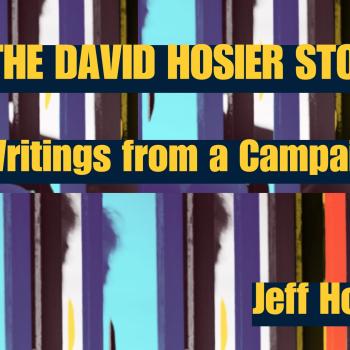
For the politically homeless among us who continue to hope against hope that one of the nation’s two major political parties might yet grasp for sanity amidst the anti-American, dystopian ideologies of today’s unreasonable Republicans and unreasonable Democrats, respectively, a former marine in his late thirties—who grew up in Appalachia, served his country, attended Yale law school, and converted to the Catholicism that came to these shores only with immigrants—might once have seemed an appealing prospect for the vice presidency (Republican or Democratic).
If said person did all this while maintaining comparatively populist economic views and comparatively traditional cultural values (i.e., was able to appeal to, essentially, an amalgamation of the Bill Clinton and Donald Trump coalitions) it would seem that we might have found someone to rise above this perilously polarized moment.
But alas.
Vice presidential candidate JD Vance is so far from improving things that he has managed, somehow, to make them worse. How and why? In large part, by having apparently skipped the late Bishop Fulton Sheen’s uniquely prescient 1931 essay on tolerance in the course of his Catholic formation.
Sheen on Tolerance and Intolerance
I’ve written about Sheen’s essay before. There is perhaps no other document that distills so clearly the attitude we need in this moment—as Americans and as Catholics—and that is so sorely lacking in both the nation and the Church.
To quote the key excerpt:
What is tolerance? Tolerance is an attitude of reasoned patience towards evil, and a forbearance that restrains us from showing anger or inflicting punishment. But what is more important than the definition is the field of its application. The important point here is this: Tolerance applies only to persons, but never to truth. Intolerance applies only to truth, but never to persons. Tolerance applies to the erring; intolerance to the error….
Tolerance does not apply to truth or principles. About these things we must be intolerant, and for this kind of intolerance, so much needed to rouse us from sentimental gush, I make a plea. Intolerance of this kind is the foundation of all stability.
As I have written before: The distinction Sheen draws here is between how we should treat people and how we should treat ideas. Wrong individuals (which means, all of us, sometimes, as we are all sinners) should be treated with tolerance and embraced respectfully in love. No individual should be individually or categorically denigrated.
Wrong ideas, by contrast, should be ripped apart and contradicted, clearly and fully, without regard to political correctness or expediency. The whole truth as God gives a given person to see it is sometimes inconvenient, sometimes counter cultural, and sometimes hurtful to others; that doesn’t change that it’s the truth as that person understands it.
Sheen’s Tolerance for People
When Vance made his mean-spirited 2021 remark about the “childless cat ladies” running the Democratic party, and when he then doubled down on that remark in his recent interview with Megyn Kelly, his vitriol was not reserved for the idea of children as a mere lifestyle choice. He was not attacking the notion of “DINK” existence and traditional parenthood as societally indistinguishable.
Had he done that, he would have sounded a lot like the former Vice President, Protestant conservative Mike Pence. One may love Pence or loathe him (I have some significant objections to his idea of what traditionalism should look like for women, and I respect but cannot share the totality of his pro-life position). But, either way, one must admit that he managed—through four years of a vice presidency under Donald Trump, no less—to keep intolerance for ideas and tolerance for people fixed firmly in his mind as two different things. This capacity is what kept him courtly and calm through a cordial debate with Kamala Harris.
Vance, by contrast, attacked Kamala Harris the person—derisively calling her, along with AOC and Pete Buttigieg, a “sad cat lady” who is “miserable in her own life” (an idea for which, by the way, there is zero discernable evidence). These people may have—and do have—some awful ideas. But, nonetheless, these people—Kamala Harris (the Vice President of the United States), Pete Buttigieg (if nothing else, a fellow veteran who served his country) and so on—are not grist for the mill of anyone’s holier-than-thou arrogance.
That as smart and ambitious a man as Vance would think that his own political peers and countless other law-abiding Americans constitute stock villains in the “Make America Great Again” montage—and that many of those beholden to that vision apparently agree with him—is, sadly, an elegy for the kind of tolerance we should all want among and between Americans.
Intolerance for people rather than for ideas offers no compassion, no Catholic charism, and no moral high ground. And, perhaps most importantly for Vance, no political value (unless one is named Donald Trump, whose admittedly deft blend of standup comedy and mean-spiritedness with a light touch is truly something to behold).
Sheen’s Intolerance for Ideas
We now know, from Saturday’s New York Times, that Vance lost a dear law school friend in April of 2021. Around that time, Vance stated on social media his (entirely defensible, and now scientifically and journalistically vindicated even by the New York Times) opposition to so-called gender-affirming care for children who believe themselves to be transgender.
In this case, Vance did nothing wrong: He spoke the truth as he (and I, and most Americans) see it in defiance of an utterly inane, unscientific, and insupportable trend. For that, he paid a great deal. This tale is emblematic of our time, in which many on the left often refuse to converse in any depth with those whose ideas oppose their own. Either they recuse themselves from mixed-politics friendships entirely (as Vance’s onetime friend did); or, more often, they quietly excise politics from the relationship.
I know whereof I speak.
Like Vance and his wife, my husband and I are an interracial couple that met as students an Ivy League institution (I am the great-granddaughter of immigrants from Italy and Romania; he is the son of immigrants from Liberia). Like Vance, we are each the product of culturally conservative, argumentative, religious Democrat parents with unromantic reality principles that spare nothing and no one—think Vance’s Mamaw, but the cosmopolitan version (I’m from a socioeconomically and racially diverse neighborhood just outside Philadelphia; he’s from the poorest neighborhood in Ohio, which is over 90% Black and just outside Cleveland).
Like Vance, we therefore entered college largely invulnerable to the pieties and sacred cows inculcated in many of our peers by the elite miseducation that makes various untrendy facts verboten and teaches students to avoid truths that might hurt someone’s feelings. And like Vance circa 2016 when his book was published (not so much like Vance now, which is its own species of problem), we hold the center circa 2008 (so, now the center-right) on many but not all cultural issues.
So, of course, I noticed in the late 2010s and peaking in 2020, when the Overton window of my own Democratic party moved sharply left, that many liberal old friends—good and loving people to a person, make no mistake—who used to happily talk politics with us decided to suddenly stop. Of course, that made me notice and appreciate all the more which of our liberal friends do continue to engage us and welcome push back in return, as well as which more centrist, politically aligned friends who share our tribe of the tribeless (we do tend to find each other) see hope on the horizon and which do not, and why. Of course, it also interested me to notice that my few more conservative friends evince none of the reticence of their liberal counterparts in reference to our centrism; on the contrary, they cheerfully call me a “squish” and eagerly try to convince me that Trump is the only way to vote in 2024. I disagree, of course; but they make good points, and I like hearing and arguing with what they have to say.
Because I like hearing and arguing with what smart people on all sides have to say.
Indeed, smart people far to my left and far to my right are those I most want to hear from; how else will I learn anything, gain any nuance, or sharpen my own understanding? But the problem with many on today’s left and today’s right is a failure to seek—unto a refusal to acknowledge—facts, if those facts are stated by someone whose political identification they do not like.
For too many liberals, misplaced intolerance for perfectly decent people who identify as Republicans results in misplaced tolerance for inane, intolerable, and detestable ideas that come from Democrats. Meanwhile, for too many conservatives, misplaced intolerance for perfectly decent people who identify as Democrats results in misplaced tolerance for inane, intolerable, and detestable ideas that come from Republicans. And, of course, these problems reinforce one another.
The antidote to this monistic fallacy now being indulged in by both sides and exemplified by Vance? Sheen’s tolerance. First, total, pluralistic tolerance for people. Second, rigorous intolerance for incorrect ideas, even when said ideas are held dear by people for whom we have total tolerance.
The 2024 Democrats and Tolerance
Right now, against all cultural odds, the Democrats are making a fragile, fitful grasp at the kind of tolerance that could imply baseline sanity.
After allowing Trump to be shot in an incomprehensible display of incompetence, the Secret Service director resigned under bipartisan questioning, much of the toughest from Democrats, that gave zero quarter for or acknowledgement to her own sex or her increased hiring of women.
Meanwhile, Kamala Harris issued a statement on antisemitic, pro-Palestinian lawlessness that hearkens to her days as a pro-incarceration (which is to say, reality-acknowledging) prosecutor. That kind of rhetoric channels my own Philadelphia’s Cherelle Parker, the city’s first Black female mayor and a centrist, tough-on-crime Democrat who handily beat two liberal opponents in the city’s primary by responding to what most people in socioeconomically disenfranchised urban communities of color actually say they want (i.e., public safety by way of good policing) as opposed to what many college-educated, predominantly white liberals insist they want (i.e., things that make many college-educated liberals feel good, like the fantasy of safe urban streets without a significant police presence). Harris may yet pick my own Pennsylvania’s Governor Josh Shapiro as her vice-presidential candidate, which would ensure America’s continued support for Israel and thereby the continued possibility of any world order.
Am I just seeing what I want to see, squinting in desperation for one of these parties to get a new American tolerance something in the vicinity of correct? Will Harris wind up being as feckless as Vance? Will she reveal an inability or an unwillingness to unequivocally rebuke, marginalize, and denigrate the most detestable ideas on her own side?
Maybe. Probably.
But hope, like the righteous application of tolerance, springs eternal.
















